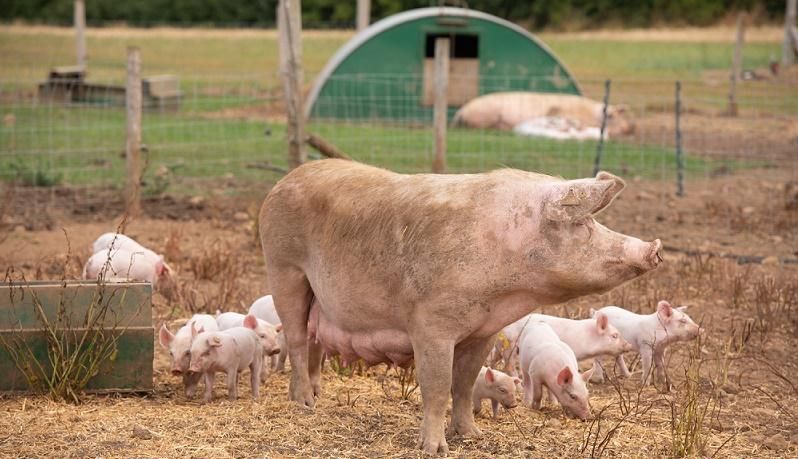The National Pig Centre

The University of Leeds farm is one of 12 leading academic institutions that form part of the Centre for Innovation Excellence in Livestock (CIEL).
Leeds is the lead organisation for pig research within CIEL. This is one of four Agri-Tech Centres, created in a collaboration between government, academia and industry to drive greater efficiency, resilience and wealth across the agri-food sector.
The aim of CIEL is to identify key challenges to the UK’s farmed animal industries and to provide world-leading, applied solutions.
Learn more and take a tour of the National Pig Centre by watching this short introductory video:
Video transcript: National Pig Centre.
Our pig research
The farm is unique in the UK as it houses both indoor and outdoor research pig herds on a commercial scale. This allows for comparisons across both production systems within our research and enables us to play a full and versatile role in conducting research to support all UK pig production.
Both our indoor and outdoor herds are reared to the highest health and welfare standards.
Our research combines genomics data with real-time information about the environmental conditions, animal growth rates and food consumption from our precision nutrition work, and behaviour and health data from automated camera monitoring. We are working to integrate these systems into the daily running of the farm to improve animal welfare, productivity and the environmental impact.
Pig nutrition
Our new facility has been particularly designed to support our expertise in sow nutrition; providing adequate experimental replication, comparing indoor and outdoor sow requirements whilst monitoring piglet survival and vitality. We also conduct research across all stages of pig production looking at the impact of carefully controlled diets on both productivity and well-being.
We have long-standing industry partnerships focusing on feeding young pigs in the critical period post-weaning. The results of these studies have been used to enhance starter feed products and develop several new feed ranges over the years. In our new facility we are able to remotely monitor individual pig feed and water intakes in the immediate post weaning period and hence will be able to gain a greater understanding of how to feed and manage piglets to reduce within pen variation.
Seeking suitable alternatives to antimicrobials that promote good gut health and prevent disease is of utmost importance for the UK pig industry. We are conducting extensive projects in this area looking at various additives and diet compositions across different growth stages.
PigSustain
PigSustain is a £2.1 million project that uses a multi-systems approach to forecast the future resilience of the UK pig industry.
An on-farm, automated and continuous monitoring system will provide early warning and assessment of pig health and welfare to predict outputs. Current and historic data on pig production is analysed in relation to changes in climate, intensification, market stability and consumer demand.
This will be used to produce a model that will help assess the economic resilience and global competitiveness of the UK pig industry in the face of current and future challenges.
Animal Welfare Epidemiology Research Group
Our Animal Welfare Epidemiology Research Group hosts a variety of research projects into animal welfare and behaviour.
Alongside the PigSustain project, listed above, other research is using individual animal tracking and monitoring to quantify feeding behaviour and activity levels.
This can be used to:
- develop optimised precision nutrition programmes to mitigate environmental emissions
- look at behavioural strategies for coping with stressful conditions and rapidly changing environments.
Further research at Leeds is helping to improve our understanding of evolutionary dynamics, looking at how the environment in the uterus impacts on the development of aggressive behaviour and fertility issues later in life.
Indoor herd
The indoor herd comprises 440 sows. Gestating sows are housed in a dynamic group on a straw-based system until farrowing when they are moved to a fully slatted, state of the art, high welfare farrowing house. We wean around 900 piglets per batch on a three week batch farrowing system.
Our sows are Large White x Landrace damline and the sire line is introduced through artificial insemination so genotype can be varied to suit particular studies.
The National Pig Centre houses growing pigs from farrowing through to market weight, allowing us to carry out research at all stages of production. In addition, our close ties with Cranswick PLC allow us to follow pigs through to slaughter for carcass assessment or meat quality analysis. Our finisher pigs are sold to market up to 115 kg liveweight. RFID tags and our custom-built management system enable individual monitoring of pigs from birth to slaughter. With this technology all collected information such as weight gain, feed intake, treatments and genetic background can be linked together for detailed analysis. Our indoor pigs are Red Tractor Scheme assured.
Outdoor herd
The outdoor unit is currently home to 220 Large White x Landrace sows. Sows are group housed until farrowing when they are moved into individual paddocks with a farrowing arc. We run a three-week batch farrowing system, producing on average 300 weaned piglets every three weeks.
All piglets produced are usually sold at weaning and are certified under the Red Tractor and RSPCA Assured schemes. The outdoor pig unit allows for not only research on the health, behaviour and productivity of our pigs, but also their impact on the local environment.
Contact us
Email the National Pig Centre at farm@leeds.ac.uk.
Follow us on X @NatPigCentre